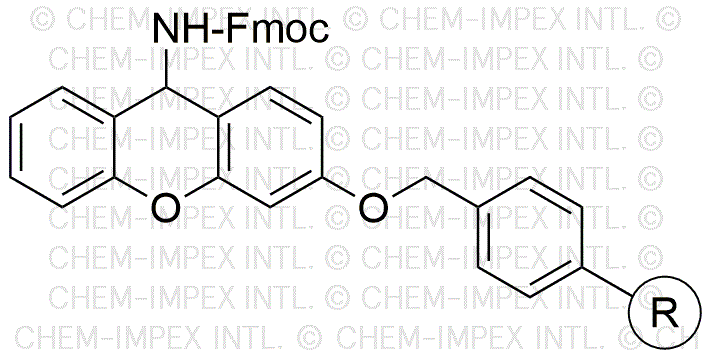9-Fmoc-aminoxanthen-3-yloxy-polystyrene resin is widely utilized in research focused on:
- Peptide Synthesis: This resin serves as a solid support for solid-phase peptide synthesis, allowing for efficient coupling of amino acids and facilitating the production of complex peptides.
- Drug Development: Researchers leverage this resin in the synthesis of peptide-based drugs, enabling the exploration of new therapeutic compounds with improved efficacy and specificity.
- Bioconjugation: It is used in bioconjugation processes, where it helps in attaching biomolecules to surfaces, enhancing the functionality of biosensors and diagnostic tools.
- Material Science: The resin is applied in the development of polymer-based materials, contributing to advancements in drug delivery systems and bioactive materials.
- High-Throughput Screening: This chemical aids in high-throughput screening methods, allowing researchers to quickly assess the biological activity of numerous compounds, streamlining the drug discovery process.
General Information
Properties
Safety and Regulations
Applications
9-Fmoc-aminoxanthen-3-yloxy-polystyrene resin is widely utilized in research focused on:
- Peptide Synthesis: This resin serves as a solid support for solid-phase peptide synthesis, allowing for efficient coupling of amino acids and facilitating the production of complex peptides.
- Drug Development: Researchers leverage this resin in the synthesis of peptide-based drugs, enabling the exploration of new therapeutic compounds with improved efficacy and specificity.
- Bioconjugation: It is used in bioconjugation processes, where it helps in attaching biomolecules to surfaces, enhancing the functionality of biosensors and diagnostic tools.
- Material Science: The resin is applied in the development of polymer-based materials, contributing to advancements in drug delivery systems and bioactive materials.
- High-Throughput Screening: This chemical aids in high-throughput screening methods, allowing researchers to quickly assess the biological activity of numerous compounds, streamlining the drug discovery process.
Documents
Safety Data Sheets (SDS)
The SDS provides comprehensive safety information on handling, storage, and disposal of the product.
Product Specification (PS)
The PS provides a comprehensive breakdown of the product’s properties, including chemical composition, physical state, purity, and storage requirements. It also details acceptable quality ranges and the product's intended applications.
Certificates of Analysis (COA)
Search for Certificates of Analysis (COA) by entering the products Lot Number. Lot and Batch Numbers can be found on a product’s label following the words ‘Lot’ or ‘Batch’.
Numéro de catalogue
Numéro de lot/série
Certificates Of Origin (COO)
This COO confirms the country where the product was manufactured, and also details the materials and components used in it and whether it is derived from natural, synthetic, or other specific sources. This certificate may be required for customs, trade, and regulatory compliance.
Numéro de catalogue
Numéro de lot/série
Safety Data Sheets (SDS)
The SDS provides comprehensive safety information on handling, storage, and disposal of the product.
DownloadProduct Specification (PS)
The PS provides a comprehensive breakdown of the product’s properties, including chemical composition, physical state, purity, and storage requirements. It also details acceptable quality ranges and the product's intended applications.
DownloadCertificates of Analysis (COA)
Search for Certificates of Analysis (COA) by entering the products Lot Number. Lot and Batch Numbers can be found on a product’s label following the words ‘Lot’ or ‘Batch’.
Numéro de catalogue
Numéro de lot/série
Certificates Of Origin (COO)
This COO confirms the country where the product was manufactured, and also details the materials and components used in it and whether it is derived from natural, synthetic, or other specific sources. This certificate may be required for customs, trade, and regulatory compliance.


